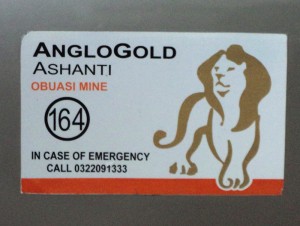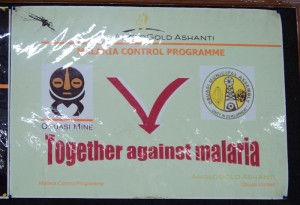
Reports from Ambassador Mark Green during his trip to Ghana last week
For those who haven’t spent much time in Africa, it’s often hard to appreciate just how much malaria affects the continent and its people. In 2010, Ghana reported nearly five million cases of malaria. Twenty-one thousand children and 2,200 pregnant women died as a result of the disease. In 2005, at the Obuasi Mine Hospital alone, there were 6800 malaria patients (employees and dependents) seen in an average month – and there were only 8,000 employees at the mine! The mine was seeing 7,500 lost man shifts per month and was spending US$ 55,500 per month.
 However, when Anglo Gold purchased its ownership in the Ashanti gold mine in Northern Ghana, it immediately spent more than $50 million to upgrade the facilities, which helped its bottom line. Anglo Gold Ashanti Mine (AGA) then took a number of steps to upgrade relations between mine management and the surrounding communities – knowing full well that communities that have foreign-owned mines often see resentment and strained relations. People who aren’t employed by the mine might wonder what they “get” as a result of the government concession for gold removal. The Obuasi Malaria Control Program (which is funded and run by AGA) is one of the many ways that mine management tries to answer that question . . . a dramatic improvement in access to health and in health itself as a result of the program.
However, when Anglo Gold purchased its ownership in the Ashanti gold mine in Northern Ghana, it immediately spent more than $50 million to upgrade the facilities, which helped its bottom line. Anglo Gold Ashanti Mine (AGA) then took a number of steps to upgrade relations between mine management and the surrounding communities – knowing full well that communities that have foreign-owned mines often see resentment and strained relations. People who aren’t employed by the mine might wonder what they “get” as a result of the government concession for gold removal. The Obuasi Malaria Control Program (which is funded and run by AGA) is one of the many ways that mine management tries to answer that question . . . a dramatic improvement in access to health and in health itself as a result of the program.
The response from OMCP is an integrated plan that encompasses the mine, the town and nearby villages. It uses insecticide-treated bed nets, indoor spraying, larvicide of breeding areas, community education and early diagnosis and treatment. AGA built the Obuasi Malaria Control Centre and donated it to the government of Ghana. The Centre is used to train health care workers and conduct high level research on treatments, including effective insecticides. It receives support from the US President’s Malaria Initiative in the form of training and technical assistance.
 The result of AGA’s investment is clear: an average decline of over 5,800 malaria cases per month since 2005 (76%). The program has won the Global Business Coalition’s “Business Excellence Award” and two Pan African Health Awards. For the immediate future, OMCP has received a grant from the Global Fund to Fight AIDS, TB and Malaria (the US is largest contributor to the fund) – the first private sector company in Africa and the second globally — to lead a major malaria program. It will dramatically scale up indoor insecticide spraying into areas well outside the AGA zone, and will do so working with the US EPA and Ghana’s Ministry of Health.
The result of AGA’s investment is clear: an average decline of over 5,800 malaria cases per month since 2005 (76%). The program has won the Global Business Coalition’s “Business Excellence Award” and two Pan African Health Awards. For the immediate future, OMCP has received a grant from the Global Fund to Fight AIDS, TB and Malaria (the US is largest contributor to the fund) – the first private sector company in Africa and the second globally — to lead a major malaria program. It will dramatically scale up indoor insecticide spraying into areas well outside the AGA zone, and will do so working with the US EPA and Ghana’s Ministry of Health.
As AGA puts it, “At Obuasi, it not only has reduced the burden of malaria in the community, increased school attendance and won the gratitude of the community (the recognition of the Government), but also reduced absenteeism at the mine, increased productivity and reduced the cost of malaria medication to our employees and dependents. At the corporate level, it has a return on investment and has the backing of shareholders.” AGA officials believe that the public/private partnership which Obuasi represents is the future of global health work in Africa. Other mining companies are already looking to learn from AGA and launch similar programs. Others already have. As the saying goes, it’s the right thing to do, it’s the smart thing to do.
To be continued . . .